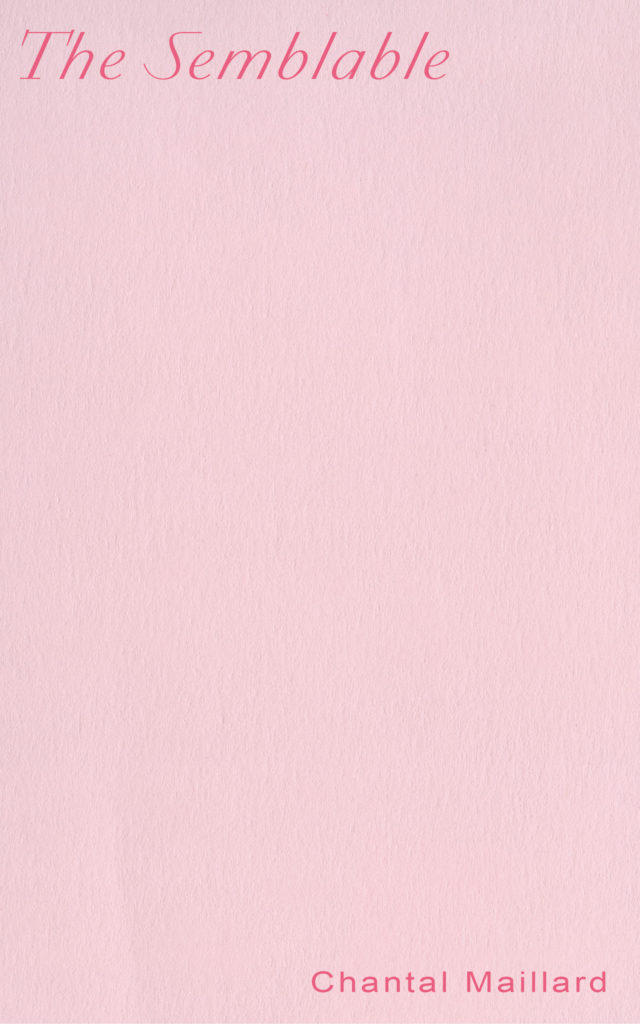Maillard is one of the most intense, honest, and radical voices of the contemporary outlook.
Marisa Blanco

The Semblable
Chantal Maillard
Translated by Whitney DeVos
December 2020
Spanish poet and philosopher Chantal Maillard asks whether a world without violence is possible. Beginning with the tale of Nietzsche’s embrace of the Turin horse, and engaging with thinkers from Confucius to Derrida to Sontag, Maillard reflects on how the concept of the “semblable” (one’s other, neighbor, peer, fellow) justifies defensive foreign and domestic policy as well as state-sanctioned global violence. Can we broaden our “frameworks of belonging” and replace our narrow group and species-centered morals with an ethics of interspecies compassion? And if we could, given that the natural world cannot be sustained without violence, would it be possible to create change without violence?
This pamphlet is part of UDP’s 2020 Pamphlet Series: twenty commissioned essays on collective work, translation, performance, pedagogy, poetics, and small press publishing. The pamphlets are available for individual purchase and as a subscription. Each offers a different approach to the pamphlet as a form of working in the present, an engagement at once sustained and ephemeral. To view a full list of pamphlets, click here.
About the Author
Chantal Maillard (born 1951) is a contemporary Spanish poet and philosopher. With a long repertoire behind her, she has received various literary prizes for her poetry. She was awarded the Spanish National Poetry Prize in 2004 for Matar a Platón and the National Critic’s Prize for Spanish Poetry in 2007, for Hilos. Her prose is particularly notable for merging and transgressing literary genres.
After receiving her doctorate in Philosophy, she spent long periods traveling and living in India, specializing in Philosophy and Religions from India at the Banaras Hindu University. Until 2000, she was a professor of Aesthetics and Art Theory at the University of Málaga. She has written articles on philosophy, aesthetics and Eastern Thought for several publications such as ABC and El País.
Maillard has also worked on stage and adapted her works to various interdisciplinary projects, in collaboration with visual and stage artists, musicians, and filmmakers from Spain and around the world.
Her latest published books are: La compasión difícil (Galaxia Gutenberg), ¿Es posible un mundo sin violencia (Vaso roto), Cual menguando (Tusquets), La razón estética (Galaxia Gutenberg), La mujer de pie (Galaxia Gutenberg), La herida en la lengua (Tusquets), India (Pre-textos), and La baba del caracol (Editorial Vaso Roto).
Praise
Chantal Maillard is an extraordinary writer. Her work in poetry and essay is dazzling. She is truly one of the most outstanding figures of the present.
Túa Blesa
Chantal Maillard is one of the most important voices writing in Spanish, who sends shivers down the reader’s spine and brings one to confront themselves and their surroundings.
Winston Manrique Sabogal
About the Translator
Whitney DeVos is a writer, translator, and scholar specializing in literatures and cultures of the Americas. She is the translator of Notes Toward a Pamphlet by Sergio Chejfec (Ugly Duckling) and The Semblable by Chantal Maillard (Ugly Duckling), as well as co-translator of Carlos Soto Román’s 11 (Ugly Duckling) and Hugo García Manríquez’s Commonplace / Lo común (Cardboard House). Involved in various collaborative editorial endeavors, most recently she co-edited Ruge el bosque: ecopoesía del cono sur (Caleta Olivia), the first volume in a series of multilingual ecopoetry anthologies aimed at a global hispanophone audience. Currently a National Endowment for the Arts translation fellow, she lives and works in Mexico City.
In the News
Links
Publication Details
ISBN: 978-1-946433-67-1
Pamphlet
Staple-bound. 48 pp, 5 x 8 in
Publication Date: December 15 2020
Distribution: Asterism Books (US), Inpress Books (UK)
Series: 2020 Pamphlet Series